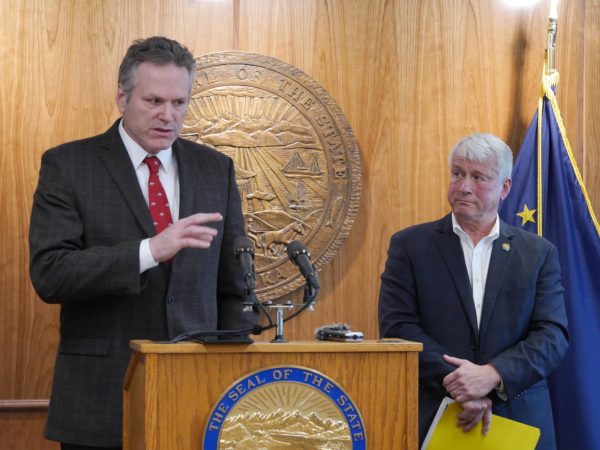
A former Coast Guard admiral and pipeline executive will head Gov. Mike Dunleavy’s advisory group on the state ferry system.
Thomas Barrett retired from Alyeska Pipeline Corporation last year and was a vice admiral in the Coast Guard until 2004. He’ll chair the nine-person advisory group tasked with charting a course for the Alaska Marine Highway System, with recommendations expected by the end of September.
Read more on chaos and politics surrounding the Alaska Marine Highway System
The governor blamed poor planning by prior administrations for the widespread disruptions to transportation across coastal Alaska that’s led to food shortages and other hardships.
“If there are individuals that wish to hang it on this administration, that’s fine,” Dunleavy told reporters on Wednesday. “We’re big boys. We’re going to work at fixing this thing. This is decades in the making.”
The governor said his team is committed to looking at regional transportation that goes beyond the Alaska Marine Highway System.
“We’re going to do everything we can to make sure that we come up with a sustainable mode or multiple methods of transportation for Southeast, Southcentral Alaska, those communities that are impacted by the ferries,” he said.
The governor said the AMHS Reshaping Working Group will be poring over a $250,000 study that his administration commissioned last year.
He also named Wanetta Ayers, former director of the state’s Division of Economic Development during Gov. Sean Parnell’s administration, to the working group. John Torgerson, a former Republican state senator from the Kenai Peninsula, is a member of the group too.
Sitting legislators in the group include Sen. Bert Stedman, R-Sitka, and Rep. Louise Stutes, R-Kodiak. Both lawmakers have been marine highway boosters that have resisted the Dunleavy administration’s deep cuts.
Other members include Robert Venables, chair of the Marine Transportation Advisory Board. Labor will be represented by Ben Goldrich of the Marine Engineers’ Beneficial Association, the union that represents the marine highway’s licensed marine engineers.
Regional service has been idle for weeks following the breakdown of the sole mainline ferry in service. That’s following sweeping cost-cutting that tied up vessels, deferred repairs and left no backup ferries.
This month, the Department of Transportation solicited interest from private companies to run passengers and limited freight in Southeast Alaska.
Alaska Transportation Commissioner John MacKinnon said his department received some potential operators.
“If the lack of available ships continues, we’re going to engage them,” MacKinnon told reporters. “And we’re going to take care of whatever transportation needs we can.”
Limited service is supposed to resume in March. But it remains unclear how long the fleet’s sole mainliner — the Matanuska — will remain offline. The ship broke down and will need to be repaired at the Ketchikan shipyard.
Transportation officials had said the ferry would be back in service in early March. But, as of Wednesday afternoon, the ship remained tied up in Juneau’s Auke Bay. No date had been set to move it south for repairs.
Jacob Resneck is CoastAlaska's regional news director in Juneau.




